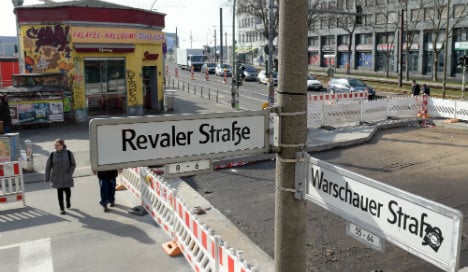Police confirmed on Monday that the dead man was a 46-year-old Nigerian of no known address. An autopsy confirmed that the stabbing was the cause of death.
The man had collapsed outside a kebab stand on the corner of Revaler Straße and Warschauer Straße in the eastern district of Friedrichshain just after midnight, police said in a statement.
Investigators are now following up leads on the killing.
In #Friedsrichshain am #RAW-Gelände ist offenbar ein Mann getötet worden. Von möglichen Tätern fehlt jede Spur. pic.twitter.com/QHnB4oZmr3
— rbb Abendschau (@rbbabendschau) February 27, 2016
Party district
Revaler Straße's many bars and clubs – and adjacent all-night kebab stands – are especially popular with young students and party tourists in the capital.
Buildings on the RAW compound – formerly train repair sheds for the East German railway operator – host cobbled-together nightspots, a climbing tower and an indoor skate park.
 The entrance to the RAW compound club district in Berlin. Photo: DPA
The entrance to the RAW compound club district in Berlin. Photo: DPABut the area has a dark side too, as it is well-known for street drug dealing and has seen violence in recent months.
A well-known punk band suffered a vicious knife attack there in August 2015 that left one of their musicians with a near fatal gash in his throat.
Despite an increased police presence in the area since the attack, drug dealing has continued on Revaler Straße almost uninterrupted.




 Please whitelist us to continue reading.
Please whitelist us to continue reading.
Member comments